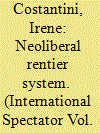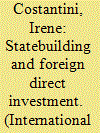|
|
|
Sort Order |
|
|
|
Items / Page
|
|
|
|
|
|
|
| Srl | Item |
| 1 |
ID:
176564


|
|
|
|
|
| Summary/Abstract |
This article contributes to the debate on whether federalism leads to ethnic accommodation and is peace-preserving through comparing the methods of ethnic accommodation in federal and unitary states. Rather than focusing on a large dataset, this article offers an in-depth picture of the role the two systems play in ethnic accommodation, offering a more nuanced understanding. The Kurds (Iraq and Turkey) and Tamils (India and Sri Lanka) have been chosen as they form territorial minorities in both federal and unitary states. The article suggests that federalist states offer a degree of acceptance toward political, cultural and economic equality with ethnic minorities. However, federalism may not be the cause of ethnic accommodation; it may be on the one hand the expression of a state willing to concede cultural, political and economic equality to an ethnic minority, or on the other hand induce such behavior. Thus, federalism without recognition of such equality does not guarantee ethnic accommodation.
|
|
|
|
|
|
|
|
|
|
|
|
|
|
|
|
| 2 |
ID:
183491


|
|
|
|
|
| Summary/Abstract |
Despite the many constraints it faces, social mobilization has been a relevant yet understudied phenomenon in Iraq after regime-change. Especially since 2011, collective actions such as protests, sit-in and demonstrations have challenged the status quo, amidst cyclical high level of violence and a dysfunctional political system. By identifying a gap at the crossroad of social movement and peace and conflict studies, this article is a preliminary exercise in investigating non-violent means to promote social and political change in violent contexts. It proposes a comparison of episodes of social mobilization in Iraq and analyses them in terms of space, types of grievances, identification of the target and overall goal. The article finds that social mobilization’s main limitations in Iraq are linked to its development in reaction to contextual factors. At the same time, it also shows the potential social mobilization has to become a locus where social and political change may grow.
|
|
|
|
|
|
|
|
|
|
|
|
|
|
|
|
| 3 |
ID:
191021


|
|
|
|
|
| Summary/Abstract |
Pizzorno’s distinction between ‘manifest’ and ‘hidden’ politics helps to explain the resilience of the consociational systems of Lebanon and Iraq in times of crises. Through the lens of ‘manifest’ politics, the Lebanese and Iraqi political systems are permanently on the brink of collapse. By contrast, through the lens of ‘hidden’ politics, the Lebanese and Iraqi political systems manifest their organised resilience. This comparative analysis of the responses to the Covid-19 pandemic in Iraq and Lebanon contributes to the debate over how consociational power-sharing works in practice as a fine-grained system to maintain the status quo.
|
|
|
|
|
|
|
|
|
|
|
|
|
|
|
|
| 4 |
ID:
152543


|
|
|
|
|
| Summary/Abstract |
The Islamic State’s conquest of swathes of Iraqi territory, combined with falling oil prices, revealed the fault lines of a model of economic development that made the country extremely vulnerable to the events of 2014. Over the last 13 years, the consolidation of the rentier economy in parallel to the promotion of a neoliberal model – a neoliberal rentier system – has not initiated a process of sustainable economic development. The main factors explaining this missed opportunity can be found in the tensions that exist between the two models and, in particular, between the relative roles of the state and the private sector as drivers of economic development.
|
|
|
|
|
|
|
|
|
|
|
|
|
|
|
|
| 5 |
ID:
172024


|
|
|
|
|
| Summary/Abstract |
On April 4, 2019, Field Marshal Khalifa Haftar launched a military strike against Tripoli, the Libyan capital and the headquarters of the internationally recognized, UN‐sponsored Government of National Accord (GNA), headed by Fayez al‐Serraj.1 The attack was a clear sign of the field marshal's intention to challenge the GNA through military means, take control of the entire country and impose himself as the undisputed leader of post‐2011 Libya. In 2014, with the launch of Operation Karamah (Dignity), Haftar and his self‐styled Libyan National Army (LNA) took control over Cyrenaica, Libya's eastern region, and from there expanded south. In summer 2018, most of Fezzan, the southern Libyan province, was brought under his control.2 Tripolitania, Libya's western region, was the last piece of the puzzle — the most populous and difficult to subjugate. Six months after the launch of the military offensive, what was envisioned as a quick victory turned into a yet‐unresolved, low‐intensity conflict between Libyan parties as well as regional and international actors.
|
|
|
|
|
|
|
|
|
|
|
|
|
|
|
|
| 6 |
ID:
124433


|
|
|
|
|
| Publication |
2013.
|
| Summary/Abstract |
Within the broader debate over the political economy of statebuilding, the role of foreign direct investment (FDI) in fragile and post-conflict settings is increasingly controversial but still understudied. This paper examines the tensions between the good governance agenda currently being implemented in Iraq and the investment dynamics occurring at the country's national and provincial levels. Drawing on disaggregated data, the paper argues that the flow of FDI is reinforcing destabilizing dynamics in Iraq by increasing levels of inequality, deepening the decentralization process, and undermining internal and external balances of power.
|
|
|
|
|
|
|
|
|
|
|
|
|
|
|
|
|
|
|
|
|